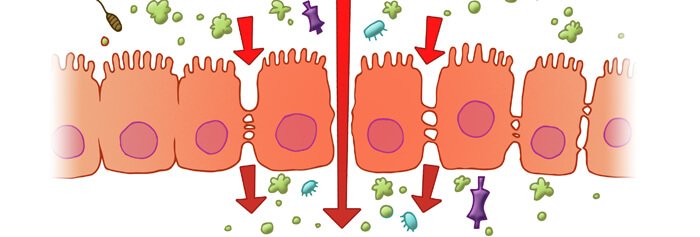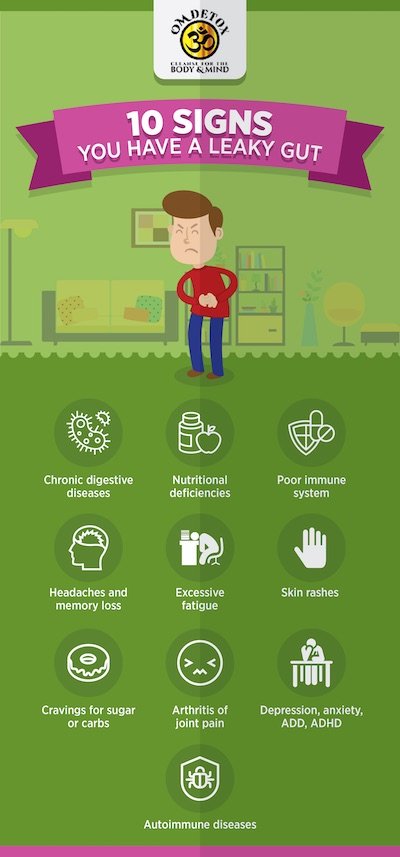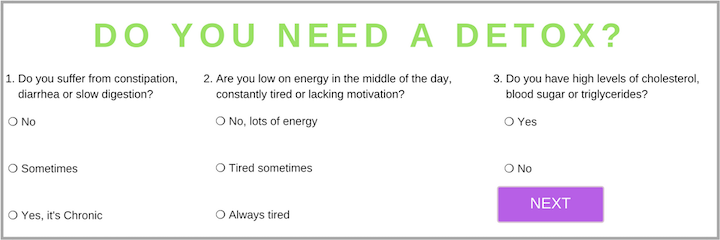Candida Albicans is naturally found in your body. It is a part of your intestinal health, along with the other bacteria that assist you in the process of digestion.
Candida is present in your mouth and in your intestines. It is a yeast-like fungus that likes to feast on sugar, which can result in an overgrowth called candidiasis.
When there is too much Candida, it starts producing a toxic by-product called Acetaldehyde, which can affect your immune system and provoke symptoms like headaches, brain fog, fatigue, weight gain, vaginal infections, and digestive problems.
Pastries, white flours, alcohol, refined grains, and other sugars feed Candida but…. this is not a problem that only occurs because of a sugar-rich diet!
A Candida overgrowth can also be the consequence of using antibiotics and other medications, birth control pills, or after a prolonged period of stress.
If you have any of these common candida symptoms, You may suffer from a Candida overgrowth…
Candida Symptoms
- Inflammation, pain after eating
- Bloating
- Intestinal gas
- Constipation
- Food intolerance
- Extreme fatigue
- Irritability
- Low libido
- Dizziness
- Psoriasis
- Strong body odor
- Fungal infections
- Dermatitis
- Ear infections
- Persistent cough
- Flu-like symptoms
- Allergies
- Asthma
- Insomnia
- Brain fog
- Acne
- Migraines
- Recurring vaginal infections
- Recurring UTI
- Acid reflux
- Mucus in stools
- Sugar cravings
- Joint pain
- Poor memory
- Inability to focus
- Coating on the tongue
- Bad breath
- Cracked tongue
- Mucus in throat
- Bags under the eyes
- Skin rash
- Eczema
- Depression
- Nausea
- Leaky gut syndrome
- Irritable bowel syndrome
- Itchy eyes
The Causes of a Candida Overgrowth?
Antibiotics can cause Candida to multiply… They are prescribed to destroy harmful bacteria that are causing illness. In the process, antibiotics also kill good bacteria.
Your intestinal health is always affected if you use antibiotics. As a result, you can face serious health problems.
Antibiotics are definitely useful for certain conditions, there’s no doubt about it… But probiotic supplements should always be taken during and after the treatment to replace the good bacteria that were killed.
If you do not use antibiotics, you are still at risk… Did you know that the animal agriculture industry feeds antibiotics to the livestock to avoid diseases and premature death? That means that you are also exposed to those antibiotics!
Choosing an organic plant-based diet is the best way to avoid being exposed to those chemicals…
Stress can also be responsible for a Candida overgrowth…
Stressful situations make you produce a hormone called Cortisol that raises your blood sugar level. Having more sugar in your blood gives extra food for the harmful yeast to eat…
Your adrenal glands can also be affected by stress…and when your adrenal glands aren’t functioning correctly, your immune system gets weaker, leaving you tired and unable to fight Candida. When your immune system is too weak, Candida is able to multiply in your gut.
When Candida is too abundant in your digestive system, your microbial ecosystem gets out of balance… This can affect your mood, your stress levels, and your emotions. This is a vicious circle!
Stress affects your microbiota, and your microbiota affects your mood.
Learning how to deal with stress is an important part of the healing process.
And taking probiotic supplements is the best treatment for gut imbalances. Look for a brand that contains many strains and at least 5 billion CFUs (colony forming units). Click here to get OM Detox probiotics.
Candida leads to Leaky Gut
When you eliminate beneficial bacteria from our guts, it makes it easy for Candida to multiply and dominate your intestines.
And when Candida populates your guts, it can mutate into a fungus… This is when everything gets out of control, creating a condition called “leaky gut”.
With a leaky gut, the waste produced by Candida gets absorbed through your intestinal wall and into your bloodstream, damaging organs and causing symptoms like inflammation, bloating, gas, constipation, food allergies, IBS (irritable bowel syndrome), fatigue, migraines, and recurring vaginal yeast infections.
What is Leaky Gut Syndrome?
The leaky gut syndrome is a disorder in which people’s intestinal wall cells have become leaky because of inflammation. The cells of the gut present abnormal spaces between each other, allowing toxic material to enter the bloodstream and make you sick.
Usually, toxins are eliminated in the gut… but not with a leaky gut. Undigested protein and fat, bacteria, parasites and other toxins can now get through the leaky membrane of the gut and infiltrate the bloodstream.
The immune system does not recognize these substances so they are treated as invaders… the immune system produces antibodies to protect itself from elements that might not have been dangerous in the first place. This causes inflammation and pain.

Leaky gut can lead to chronic inflammation of the bowels, in the joints and even in the brain. People with a history of parasitic infections or candida overgrowth seem to have high risks of having to deal with a leaky gut.
Drug abuse and alcoholism, Ulcerative Colitis, Celiac, and Crohn’s disease are other common causes of leaky gut. It is the inflammation that triggers it and makes the spaces between the cells larger than they should be… Avoiding food that triggers the inflammation might be the key.
What Are the Symptoms of a Leaky Gut?
- Gas, bloating, constipation, diarrhea, and abdominal pain
- Food intolerance
- Sensitivity to cigarette smoke, perfume, and other chemicals
- Asthma and allergies
- Extreme fatigue
- Mood disorders
- Skin problems
How to Get Rid of Candida
Getting rid of Candida Albicans can be a real nightmare… People make many mistakes when they try to eliminate Candida.
Following a strict candida diet protocole is not easy but it can help you get rid of the yeast quickly. You’ll see, the list of foods to avoid is very long! The candida diet demands that you not only avoid industrial sugars… but also all fruits, caffeine, alcohol, and processed food.
Why is coffee bad for Candida?
Coffee beans often contain a type of mold called trichoderma, which can create allergic reactions. The contact with mold should be avoided completely if you suffer from candida overgrowth.
Drink water of herbal tea instead.
Caffeine also destroys vitamins and minerals like Vitamin B1 & B8, biotin, zinc, and potassium… and it can inhibit the assimilation of iron and calcium.
Coffee may also be responsible for the destruction of some of your gut flora…
Caffeine also stresses your adrenal glands because it makes them produce adrenaline. When drained, the adrenals can’t regulate the hormone levels of your body. This affects your immune system and can cause weight gain, as well as mood disorders and sleep disorders.
If your immune system is weak, your body won’t be able to fight candida, letting it overpopulate your gut.
Caffeine also increases blood sugar levels, which feeds Candida Albicans.
The Die-off symptoms
Certain “die-off” symptoms can be felt when the candida cells are dying rapidly… like headaches, swollen glands, skin breakouts, aches, and fever.
This is due to the by-products produced by Candida that are released into the bloodstream… like acetaldehyde, uric acid, and ethanol.
Eliminating candida from your system is great, but your experience might be difficult at some point. Die-off symptoms can vary from a person to another, depending on the type of infection you have.
To help yourself, drink a lot of water, rest, eat the right diet, and take supplements of Vitamin C, molybdenum, and milk thistle.
There are several antifungal treatments available such as Diflucan, Nystatin, and Exaxis. However, you can choose a natural approach with herbs, foods, and remedies that can be added to your detox diet, for their antifungal properties.
Natural Antifungals
- Pau D’Arco
- Oregano oil
- Garlic
- Turmeric
- Aloe vera
- Black walnut
- Cinnamon
- Cloves
- Coconut oil
- Grapefruit seed
- Olive leaf extract
All these antifungals are great at killing Candida cells, but they are also harsh on your gut microbes. The healthy ones…
Probiotics should be taken daily to restore your microbiome and heal your leaky gut…
How Can you Heal Leaky Gut?

Watching what you eat is the first step towards healing. Avoiding all the foods that trigger the inflammation is important if you want to treat the cause of your leaky gut, rather than just your symptoms.
Try an elimination diet… Eat simple meals and note your reactions. You will be able to avoid the ingredients that are causing your symptoms.
Common foods that create inflammation in people are dairy products, gluten, industrial sugars, meats, and processed products. A good detox program will also help get rid of unwanted guests like parasites and worms.
Bentonite clay is a powerful absorbent that can transport the toxins produced by bacteria out of the digestive track. Once the bowels are clean, you can support the healing process with wheatgrass and organic vegetable juices along with a whole food plant-based diet.
Probiotics must be taken in order to restore your microbiota. Different strains of Lactobacillus and Bifidobacterium are recommended.
The amino acid Glutamine is also known to be effective at reversing the damage caused by leaky gut. It is used by the body for repair and healing.




